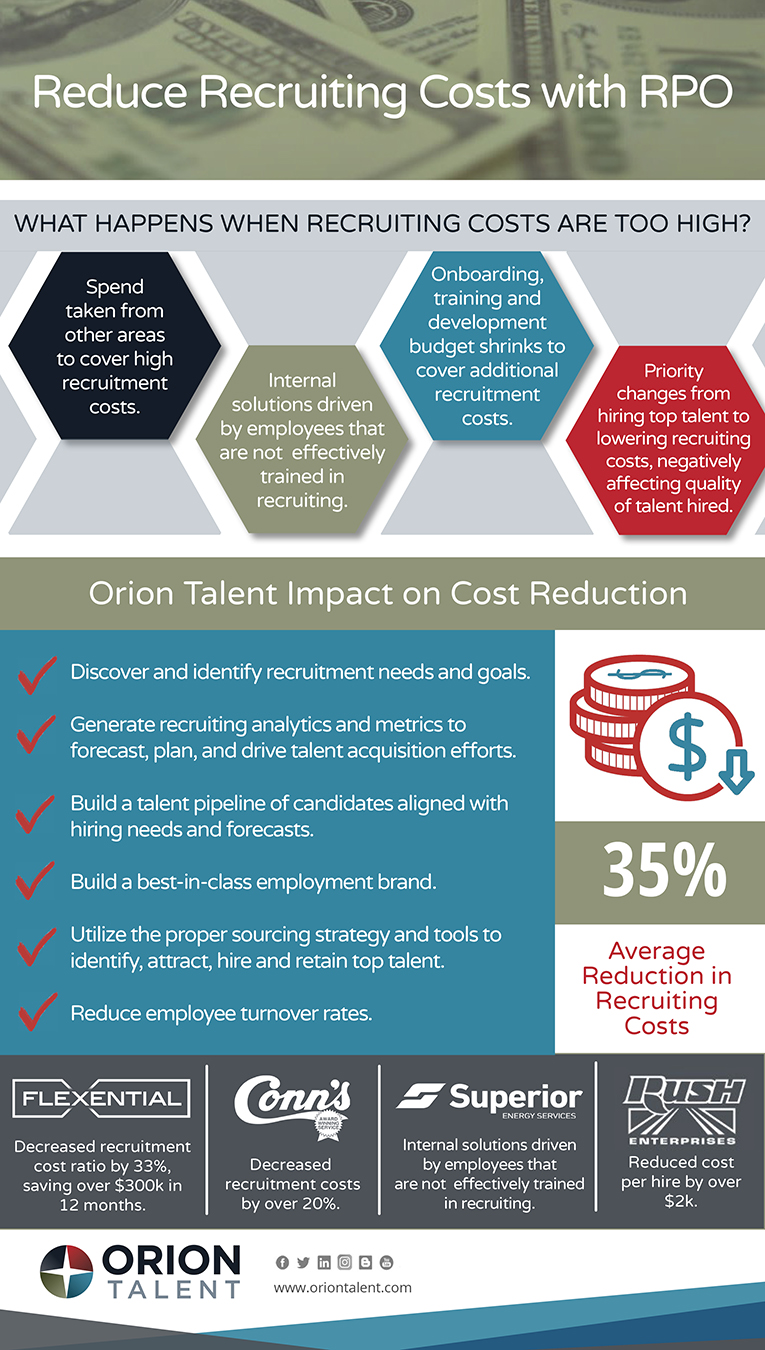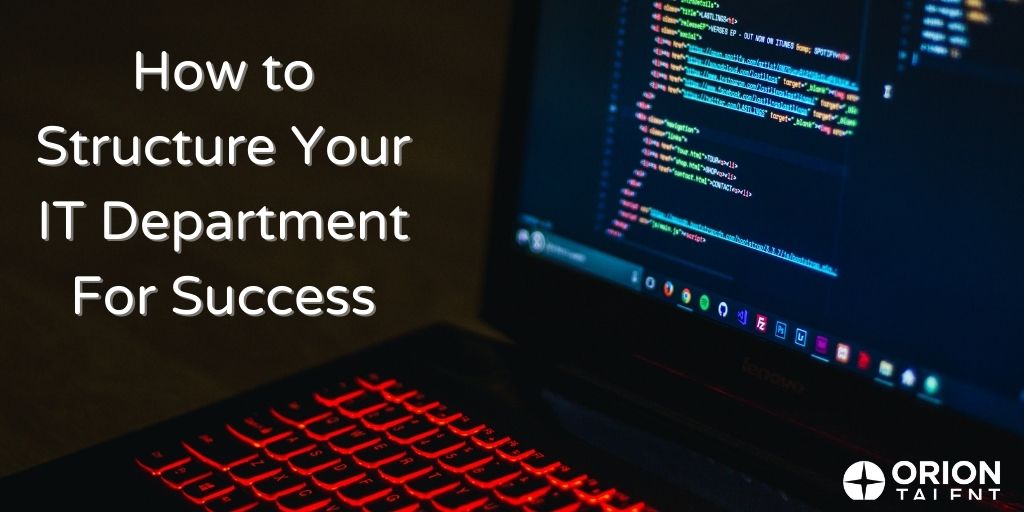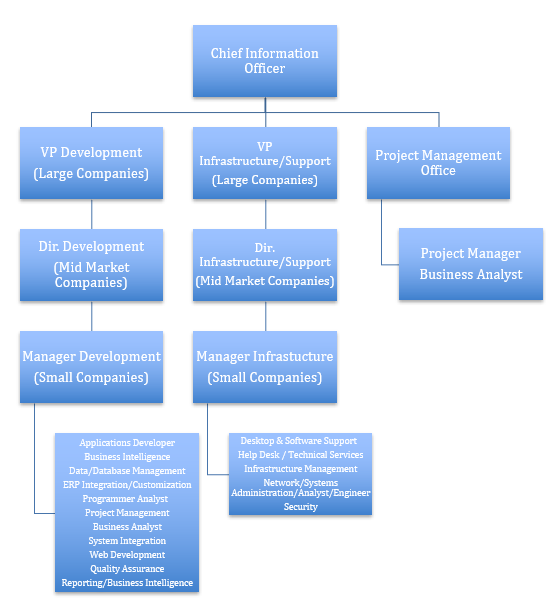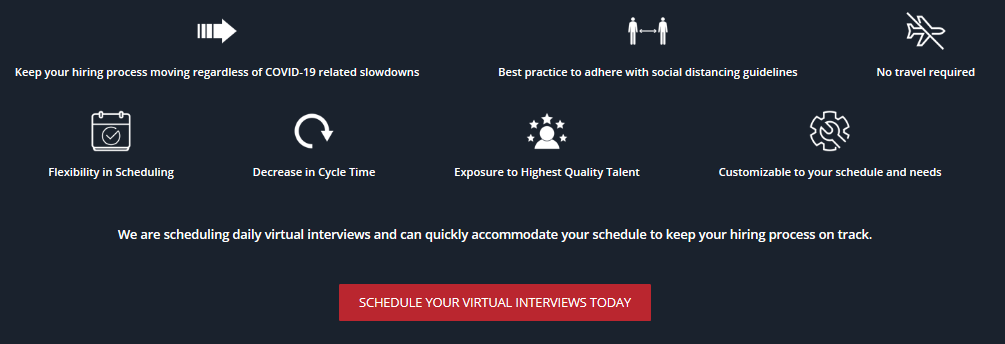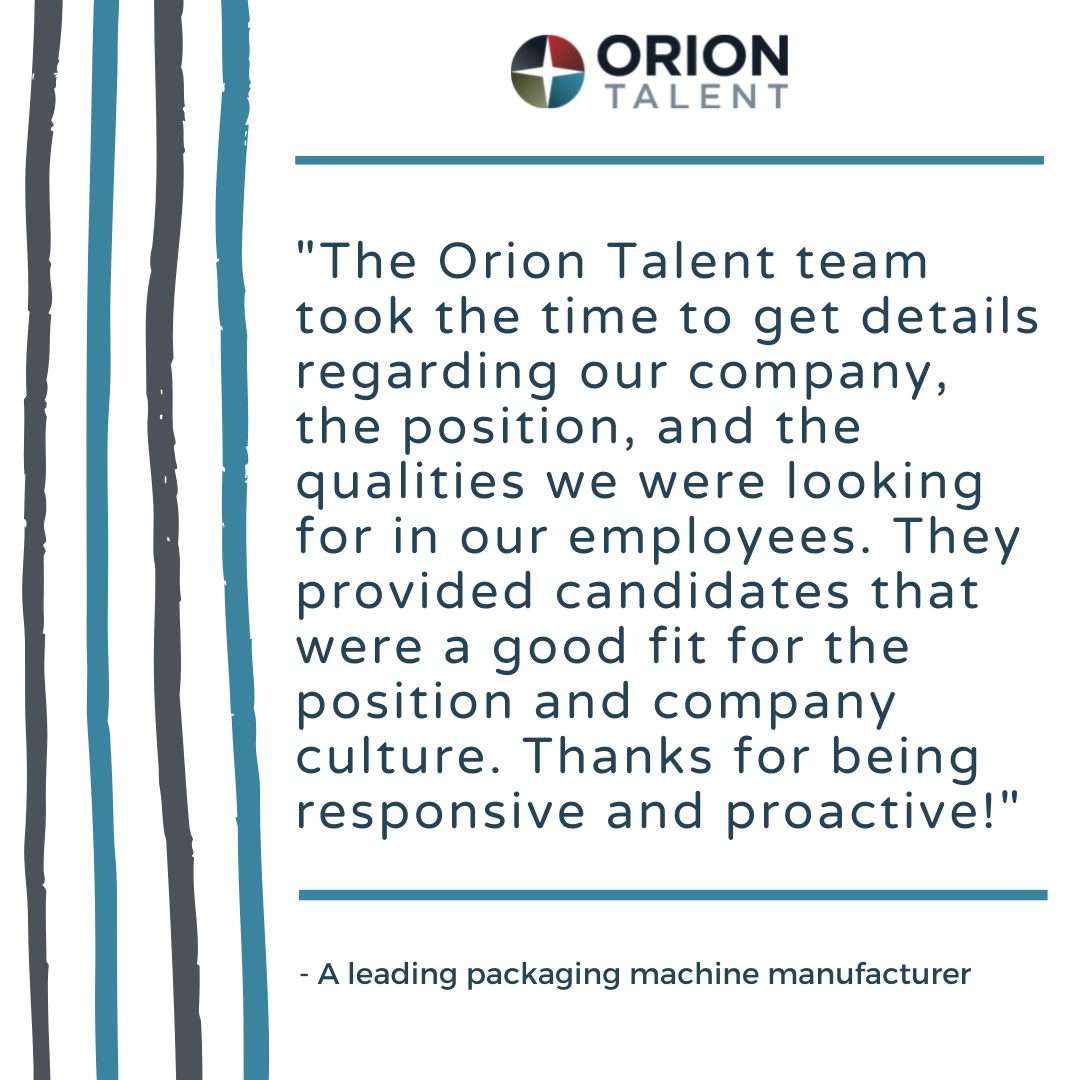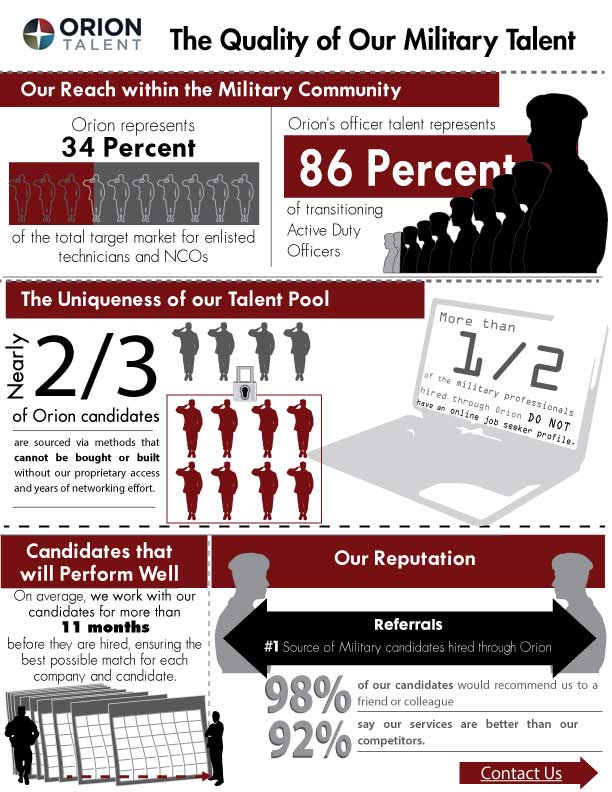Talent Insider
Saturday, January 1, 2022
In This Issue
INFOGRAPHIC - Reduce Your Recruiting Costs With RPO
How to Choose the Right RPO Model
How Gaming Industry Talent Can Fill In-Demand IT Roles
How to Structure Your IT Department For Success
On-Demand Virtual Hiring Events Through Orion Talent
Join our LinkedIn Group - Talent Insider with Orion Talent
INFOGRAPHIC - Reduce Your Recruiting Costs With RPO
Are you spending too much time and money on turnover and hiring new employees? Recruitment costs are draining more than just your budget. Resources used from other areas of the company, onboarding and development, quality of talent, and internal employees are all negatively impacted when recruitment costs climb.
Check out our new infographic below to learn how recruiting costs are negatively affecting your business, and learn how Recruitment Process Outsourcing (RPO) through Orion Talent has resulted in reductions in recruitment costs for our customers.
How to Choose the Right RPO Model
Maybe you have been there. Your team is tasked with hiring in a highly competitive job market with a non-existent employer brand. Or maybe your recruiting team is simply outpaced by demand brought on by surge hiring. Or maybe you don’t have a recruiting team at all! All of these obstacles lead to increased time to hire, increased turnover, decreased hiring manager satisfaction, and increased cost per hire. Recruitment Process Outsourcing (RPO) can help.
In RPO, businesses outsource some or all of their recruitment process to an outside provider, enabling them to focus on their core business functions. And, depending on the scale of your recruiting needs, there are various RPO models that will offer just the right amount of engagement to take your recruitment initiatives to the next level.
How is a RPO team structured?
Recruitment Process Outsourcing engagements are led by the Executive Oversight and Management team, which includes leadership from the RPO provider - titles may include Vice President of Client Success, Vice President of Talent Solutions, or Vice President of Talent Acquisition / Recruiting. At the Delivery, Account, and Team Management level are the Director and Manager. The RPO provider’s Recruiters are the face of the RPO engagement for the client’s Hiring Managers and Candidates. Handling scheduling, reporting, research, reporting, marketing, and implementation are conducted behind the scenes by Recruitment Operations Administrators and Shared Services.
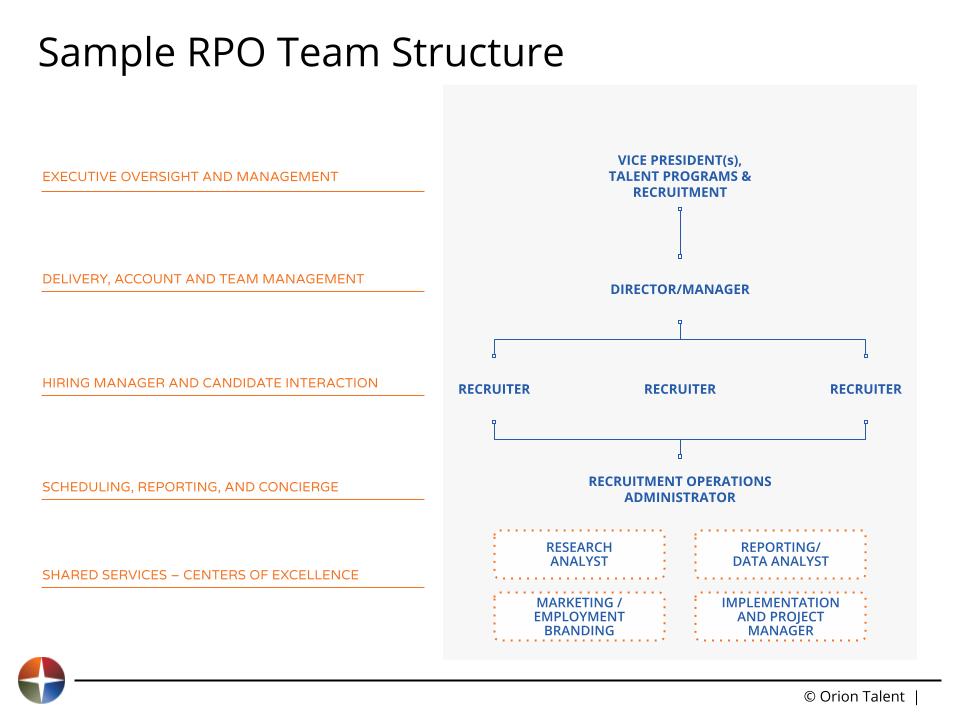
Who does an RPO team coordinate with from a business?
The RPO Provider’s team will have connection points with various members of the company. At the leadership level, the company’s Chief Human Resources Officer (CHRO) or Sr. VP of HR / TA will likely interact with the leadership team from the RPO Provider. HR and TA Directors and Managers will work with the RPO Provider’s management team. The management and oversight team will determine appropriate metrics and key performance indicators (KPIs), which will drive the performance of the engagement.
Recruiters and Recruiting Managers will typically interact directly with the Hiring Managers from the business on a daily and weekly basis. The Hiring Manager will work with the recruiters on the specific positions to be filled, candidate pipeline, interviews, and the selection process. Reporting occurs weekly, monthly, and quarterly to measure performance and allow for adjustments to be made.
If there is an active marketing and employment branding component within the program, the provider’s Marketing team will work with members of the company’s Marketing, Corporate Communications, or Web teams, as appropriate.
What are the different models of RPO?
Enterprise RPO
With Enterprise RPO (sometimes also called Full Cycle or End to End), an RPO team becomes an extension of your team to effectively and efficiently manage each element of your TA strategy, from requisition to onboarding. This is a full-service offering that will transform your talent acquisition and recruitment process. Learn more about Full Cycle, End to End, & Enterprise RPO.
How is Enterprise RPO priced?
In Enterprise RPO, all your many hiring costs are rolled into a single cost, so you know what expenses are coming down the pipeline every month. All services are built into the scope of the RPO, so companies have a set fee for budgets. For this type of RPO, the fee is typically based on a monthly Management Fee Model. This can be based on an agreed-upon number of positions and change depending on the agreement or escalation factors such a need to scale for more hires.
Contingent RPO
Contingent RPO is a hybrid recruiting model that applies the power of RPO to contingent hiring needs. A dedicated team of experienced recruiters builds a unique talent pipeline of contingent labor for your company based on your specific needs, allowing you to focus long-term hiring strategies.
Global RPO
Not technically a service line, Global RPO is more indicative of breadth of service. Global RPO is responsible for openings worldwide as opposed to within a specific region. The benefits of RPO are especially applicable when dealing with a global candidate base and companies with operations in many parts of the world.
Project RPO
In Project RPO or Initiative-Based RPO, providers partner with you to deliver talent acquisition projects that will occur within a specific period of time. You define the hiring objectives, and they help achieve them on-time, on-budget. These projects often have defined goals within a specific scope and timeline.
How is Project RPO priced?
Like Blended RPO, Project RPO is often priced off of a Cost per Hire or Cost Per Slate model.
Which RPO Model is right for you?
- If you don’t have your own HR team and want to outsource all functions of your recruiting and hiring, choose Enterprise RPO because this option will create and manage your TA strategy, from the smallest detail to largest priority.
- If you are ramping up hiring for a new product line or new facility, choose Project RPO because it can help you meet defined goals within a specific scope, budget, and timeline.
- If you are looking for the value of RPO, but also need to ramp up hiring quickly to fill high-volume or seasonal non-permanent roles, consider Contingent RPO.
- If you want to test drive RPO, choose Project RPO because you can try out the services for specific initiatives over a specified period of time and then determine if the results are worth a more long-term engagement.
- If your company is experiencing aggressive growth but has no standardized recruiting processes, choose Enterprise RPO because it can help you scale and centralize your recruiting processes.
- If you need to support a business unit, specific location, or critical position, choose Project RPO because they will work within your Human Resources department on only the desired unit, location, or position, freeing up your team to focus on other priorities.
How is Full Cycle / End to End RPO different from Enterprise RPO?
Nearly identical to Enterprise RPO, Full Cycle / End to End RPO could apply to an RPO engagement covering only North American requisitions in a situation where another provider is simultaneously engaged for global requisitions.
How is Initiative-Based RPO different from Project RPO?
Essentially the same in scope, Project RPO may span a longer timeframe than Initiative-Based.
Choosing the Right RPO Model
As you can see, there are many ways in which RPO can be leveraged to improve or transform a company’s recruiting processes. From Enterprise to Contingent to Project, RPO can be a flexible, scalable solution that offers cost savings of more than 60% to 75% cost savings over traditional staffing firms. If you are seeking innovative talent acquisition solutions for your organization, division, or a large project, visit us online to learn more about Recruitment Process Outsourcing (RPO) Services from Orion Talent.
Learn More About RPO:
- 4 Reasons For RPO: What is it & What Does RPO Mean?
- RPO VS. Staffing - What's The Difference Between RPO and Staffing?
- How Does Talent Acquisiton RPO Work?
- Why Do Companies Outsource Recruitment?
- Try Our RPO Questionnaire
- Improve Your Time-to-Fill with RPO
- What's the ROI of RPO
- How does Manufacturing RPO Work?
- The Six Impact Areas of Recruiting Process Outsourcing
- The Seven Steps of the Recruitment Process
- Tile to Fill vs Time To Hire
- The Top Ten Recruiting Metrics
How Gaming Industry Talent Can Fill In-Demand IT Roles
Gaming Talent
As Antonio Gonzalez, Director of IT Recruiting at Orion Talent, points out in his recent InformationWeek article, gamification has found its way into non-gaming industries, such as customer experience, employee engagement, and product development. This means game skillsets like 3D modeling and motion tracking are necessary, leaving some IT leaders in unfamiliar territory. In Don't Overlook Gaming Industry Talent to Fill In-Demand IT Roles, Antonio, reveals the benefits of embracing these skilled engineers, developers, designers, and 3D artists.
Gamification Cheat Sheet
Antonio advises that even though gaming resumes often include unfamiliar language, IT hiring managers should become familiar with certain skill sets that should signal top talent such as 3D Studio Max, Unity, Unreal Engine, Motion Builder, Qt, 3D Maya, Jira, and Bugzilla. Additionally, he offers a cheat sheet for what type of experience employers in Manufacturing, Education, Telecommunications, Healthcare, and Retail should look for, in order to leverage gaming talent.
Engaging Gaming Talent
Finding and engaging gaming talent may require a new approach. Antonio suggests seeking out new college game development program graduates and looking for reels and resumes posted online.
Recruit Gaming Talent Now
Cutting-edge gaming talent can take your IT department to the next level with elegant designs and thoughtful interfaces. Check out Antonio’s full article for more insight and tips here. And, if you are ready to recruit gaming talent, Orion Talent can help. Visit us online to learn more about our IT Search Solutions or Game Development Search Solutions.
Meet Antonio
 Antonio Gonzalez has twenty years of combined Professional Search, Training, Business Development, & Recruitment experience, with expertise in IT, Video Games, Online Gambling, Sports Applications, and Network Security. Antonio focuses on building long-term relationships with both clients and candidates, resulting in many successful partnerships.
Antonio Gonzalez has twenty years of combined Professional Search, Training, Business Development, & Recruitment experience, with expertise in IT, Video Games, Online Gambling, Sports Applications, and Network Security. Antonio focuses on building long-term relationships with both clients and candidates, resulting in many successful partnerships.
Learn more about IT Professional Search:
Proven Search Solutions for Game Development
Proven Search Solutions for Computer, Software, and High Tech Positions
Download: Case Study - International Identity Management Software Company
Tech & IT Recruitment Process Outsourcing - RPO
How to Structure Your IT Department For Success
According to this Wall Street Journal article, IT budgets next year are expected to rise at the fastest rate in more than 10 years as businesses invest in technologies that give their organizations greater flexibility. With the investment in these technologies comes the need for talent that can support its implementation. Finding this talent and plugging them into an optimal IT department structure is integral to innovating new products, safeguarding company and consumer data, and ensuring on-demand availability of system resources.
How are most Information Technology Departments Structured?
IT departments are generally broken down are in three major groups:
- Development - This includes App Development, Web Development, Business Intelligence, Reporting, and Database Development
- Infrastructure - This includes anything Hardware related, as well as user support, and security when this function is not segmented into its own function.
- Functional - This includes your Project Managers, Business Analysts, and Technical Writers.
How should corporate and startup companies differ in their approach?
Companies approach the structure of their IT department differently depending on what stage of life their business is in. There is no one ideal IT department structure, as it should be the one that facilitates a company’s growth. And, as the company grows, that structure can change.
For startups, day-to-day IT tasks are often left to whoever has the highest aptitude for that particular issue. Asset protection and IT security are usually outsourced at this level. It used to be that it wasn’t until a company became mid-sized that you would see someone with an IT title. But companies are quickly realizing that this support is key, even at the start-up level.
Larger, more established companies have entire IT departments with various functions and clearly defined roles. The roles support both the IT needs of the company and the customer.
How does the Agile framework impact traditional IT department organizations?
Software development teams leverage agile methodologies, including pair programming, test-driven development, stand-ups, planning sessions, and sprints to encourage collaboration and self-organizing, cross-functional, autonomous teams. This approach is squarely opposed to a more traditional framework. In traditional development, the team takes a clearly defined, linear approach where they methodically analyze, design, develop, and test software.
And while the principles of Agile software development are popular, according to Stacia Norman, Director of IT Recruiting at Orion Talent, it has not found its way into traditional IT departments. “I have found that many companies have accelerated application development using agile methods and standards, but it is still not common to apply agile methods and standards to IT infrastructure and operations. Most organizations focus on stability over speed. Infrastructure services still use a process involving hands-off and delays trying to avoid mishaps,” she explains.
What roles can be outsourced?
Outsourcing IT roles may be a function of a company's life stage or desire to fully staff an IT department. In either case, there are specific IT roles that can be outsourced to skilled professionals:
- Help Desk
- Cybersecurity
- IT infrastructure
- App development
- Network Administrator
- Software Developer
- Software Tester
- Security Analyst
- Systems/Database Engineer
What roles need to be in-house
Tasks associated with automation, as well as those that are consistent and routine are best kept in-house. Alternatively, outsourcing should be considered for specific, highly-skilled, non-routine tasks completed by the roles above.
Find the Right IT Talent
Part of structuring an ideal IT department is staffing it with the right talent. Many employers are finding that they can't find the talent because the best IT candidates never apply online. Or their recruiting process lacks consistency, making it expensive and difficult to uncover the right talent for their complex IT positions. Or possibly their IT budget is increasing due to investment in new technologies, but they can't hire experienced talent fast enough to adapt to it.
Our solution to these hurdles? Consider partnering with an experienced IT Professional Search firm like Orion Talent that knows where to find sought-after talent. Whether you need to hire one CTO or 50 Front End Developers, Orion Talent can fill positions quickly due to our extensive networks of passive candidates.
On-Demand Virtual Hiring Events Through Orion Talent

- How many candidates would you like to hire?
- When would you like to virtually interview Orion's candidates?
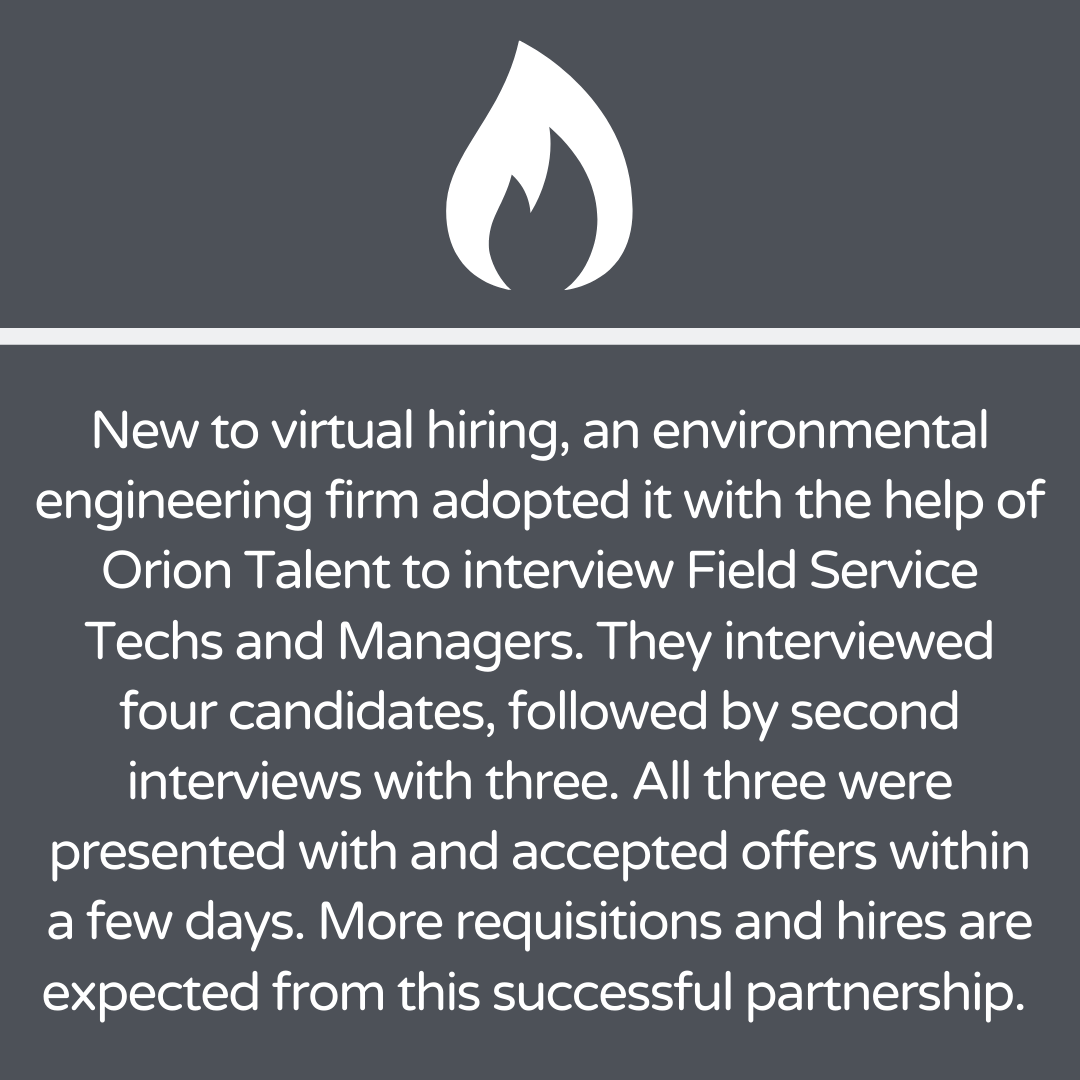
Join our LinkedIn Group - Talent Insider with Orion Talent
Have you joined our LinkedIn group, Talent Insider with Orion Talent? Talent Insider with Orion Talent is a group for all hiring managers, employers, and talent acquisition professionals interested in learning more about how to hire top talent. We are proud to offer access to employer resources, including thought leadership, hiring event notifications, podcasts, blog posts, news, other insights and advice, and more!
We also encourage you to share your expert insight, as well! Whether it be through RPO, Search, Military, Attraction & Sourcing, or Total Talent Solutions, this group will help you achieve the talent outcomes your business needs.
According to our Clients
Refer a Military Job Seeker or Client Company to Orion
If you would like the chance to win a $50 gift card, enter into our monthly drawings for Client referrals and Job Seeker referrals. If your referral results in a hire, you will personally receive a $100 gift card as our way of saying thank you. As always, we will maintain your privacy and never share your information nor that of your referral. That's one entry for each referral that you submit - good luck and thank you for the referral!
Michelle Luna Victoria won the Job Seeker Referral monthly drawing
and is the winner of a $50 gift card.
Connect with Orion
Follow us to keep up-to-date on all things Orion through our social media listed below.


